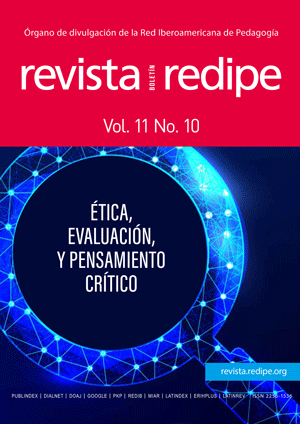Pehuajó solidarity network as a link for a pedagogy of solidarity and otherness between formal and informal education
Main Article Content
Keywords
Pedagogy of solidarity, Pedagogy of otherness, Network, Formal education, Informal education
Abstract
The Pehuajó Solidarity Network (RSP), intends (since its origin in February 2017, in the district of Pehuajó, located west of the province of Buenos Aires, Argentina) to be a second-tier civil entity, in the process of formation. that brings together non-profit civil associations, of the first degree, existing in the Party, whose purpose is to develop social policies (informal education), linking the participation of children, youth and adults (formal education), in joint actions to deploy as an organizing principle a Pedagogy of Solidarity and Otherness. From this perspective, collective and democratic participation is promoted in and to frame shared projects and subprojects in the short, medium and long term. The purpose is to generate an “between” spheres: publicprivate, urban-rural, political-social-cultural; with co-responsibility for building a sustained citizenship on the pillars of: trust, commitment, democratic participation, identity, belonging and ethical attitude, in the complexity of everyday life that leads to configuring an “us”, as the second organizing principle of a learning community in network.
The objective is to go beyond a good gesture towards the community, something more than a formal and informal applause, something more than celebrating the network of solidarity. It is rebuilding, accompanying each other, thinking together in order to improve the quality of life of citizens and their institutions. That is, to experience a “we” where the value of Solidarity Pedagogy is fed back from interests and needs, applying in doing, the fundamental capacities of the subjects to act as a “whole”. Furthermore, we understand that if we add the Pedagogy of Otherness to the Pedagogy of Solidarity, the third principle is produced (philosophically speaking) of “altering” or transforming one’s own “look” for that of the “other”. Present and prospective paradigm of a conception of the world-place itself, creating new questions that lead us to rethink together how to innovate with social justice, the passion of the sense of peace, establishing in the human bond, the great human questions: “love”, accepting the “vulnerability” that makes us responsible for the other as Other; “friendship” adding reasonable cooperation, “...relationship without dependency, without episode, and where all the simplicity of life enters...(...)...friendship that puts one in relation to the other in the difference and sometimes in the silence of the word…” (Blanchot, 1971: 328- 329); and “justice”, where caring for oneself leads to caring for the other and knowing that we are there taking care of ourselves.
References
Cook, T.D. y Reichardt, CH.S., (1986). Métodos cualitativos y cuantitativos en investigación educativa. Madrid: Morata.
Coronado, M. (2012). Competencias sociales y convivencia. Herramientas de análisis y proyectos de intervención. N noveduc
Derriga, J. (2000). De la hospitalidad. Ediciones de la Flor. Buenos Aires.
Gretchen, H.; Levitsky, S.; (2003). (editors), Informal Institutions and Femocracy. Lessons from Latin America, Baltimore, Johns Hopkins University Press, 2006,351 pp- julio 2008. Batlle, M. Perfiles Latinoamericanos 31. Enero- Julio 2008
Gretchen, H.; Levitsky, S.; (2003). Informal Institutions and comparative politics: A research agenda. Ponencia presentada en Informal Institutions and politics in Latin America Kellog Institute for International Studies, University of Notre Dame, 24-25 de abril.
Imen, P. (2012) Una Pedagogía para la Solidaridad. Cooperativismo en el siglo XXI. Espacio Editorial.
Levina, E. (2000) La huella del otro. Taurus. México.
Nicastro, S. Greco, Ma. B. (2009). Entre trayectorias. Escenas y pensamientos en espacios de formación. Homo Sapiens.
O ́Donnell, G. (1997). ¿Democracia delegativa?, en Contrapuntos, cap.10, Buenos Aires. Paidós, pp 287-304. ––––, 1996, Otra Institucionalización, en Revista Ágora, núm.5, invierno, Buenos Aires, pp.5-28.
Pérez Serrano, G. (2004). Investigación cualitativa. Retos e Interrogantes. 2 vol. Madrid. La Muralla.
Pérez Serrano, G. (2007). Modelos de Investigación cualitativa en Educación Social y Animación Sociocultural. Aplicaciones prácticas. Madrid. Narcea.
Pérez Serrano, G., (1990). Investigación -Acción. Aplicaciones al campo social y educativo. Madrid.
Skliar, C. Larrosa, J. (comp.). (2009) Experiencia y alteridad en educación. FLACSO Argentina. Homo Sapiens. Ediciones.



